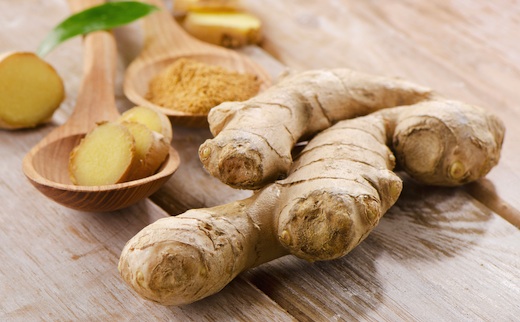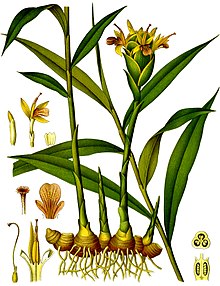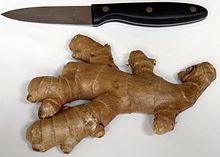Ginger or ginger root is the rhizome of the plant Zingiber officinale, consumed as a delicacy, medicine, or spice. It lends its name to its genus and family (Zingiberaceae). Other notable members of this plant family are turmeric, cardamom, and galangal. Ginger cultivation began in South Asia and has since spread to East Africa and the Caribbean.
Ginger Herb Top Ten benefits
1. Ovarian cancer treatment
2. Colon cancer prevention
3. Morning sickness relief
4. Motion sickness remedy
5. Reduces pain and inflammation
6. Heartburn relief
7. Prevention of diabetic and Nephropathy
8. Migraine relief
9. Menstrual cramp relief
10. Cold and flu prevention
Preliminary research indicates that nine compounds found in ginger may bind to human serotonin receptors which may influence gastrointestinal function. In a 2010 study, daily consumption of ginger was shown to help ease muscle pain associated with exercise by 25%. Ginger root supplement has been identified in one study to help reduce colon inflammation markers such as PGE2, thus indicating a measure that might affect colon cancer.
In limited studies, ginger was found to be more effective than placebo for treating nausea caused by seasickness, morning sickness and chemotherapy, although ginger was not found superior to placebo for pre-emptively treating post-operative nausea. Data suggests that ginger is mutagenic, and studies warn against taking it during pregnancy, though antimutagenic effects have also been reported. Other preliminary studies showed that ginger may affect arthritis pain or have blood thinning and cholesterol lowering properties, but these effects remain unconfirmed.
Ginger Folk medicine
Ginger house rum, Madagascar The traditional medical form of ginger historically was called Jamaica ginger; it was classified as a stimulant and carminative and used frequently for dyspepsia, gastroparesis, slow motility symptoms, constipation, and colic. It was also frequently employed to disguise the taste of medicines.Some studies indicate ginger may provide short-term relief of pregnancy-related nausea and vomiting. Studies are inconclusive about effects for other forms of nausea or in treating pain from rheumatoid arthritis, osteoarthritis, or joint and muscle injury. Side effects, mostly associated with powdered ginger, are gas, bloating, heartburn, and nausea.
Tea brewed from ginger is a common folk remedy for colds. Ginger ale and ginger beer are also drunk as stomach settlers in countries where the beverages are made. In Burma, ginger and a local sweetener made from palm tree juice (htan nyat) are boiled together and taken to prevent the flu.
In China, ginger is included in several traditional preparations. A drink made with sliced ginger cooked in water with brown sugar or a cola is used as a folk medicine for the common cold. "Ginger eggs" (scrambled eggs with finely diced ginger root) is a common home remedy for coughing.The Chinese also make a kind of dried ginger candy that is fermented in plum juice and sugared, which is also commonly consumed to suppress coughing.
Ginger has also been historically used to treat inflammation, which several scientific studies support, though one arthritis trial showed ginger to be no better than a placebo or ibuprofen for treatment of osteoarthritis.
In Congo, ginger is crushed and mixed with mango tree sap to make tangawisi juice, which is considered a panacea.
In India, ginger is applied as a paste to the temples to relieve headache, and consumed when suffering from the common cold. Ginger with lemon and black salt is also used for nausea.
In Indonesia, ginger (jahe in Indonesian) is used as a herbal preparation to reduce fatigue, reducing "winds" in the blood, prevent and cure rheumatism and control poor dietary habits.
In Nepal, ginger is called aduwa, अदुवा and is widely grown and used throughout the country as a spice for vegetables, used medically to treat cold and also sometimes used to flavor tea.
In the Philippines, ginger is known as luya and is used as a throat lozenge in traditional medicine to relieve sore throat. It is also brewed into a tea known as salabat.
In the United States, ginger is used to prevent motion and morning sickness. It is recognized as safe by the Food and Drug Administrationand is sold as an unregulated dietary supplement. Ginger water is also used to avoid heat cramps.
In Peru, ginger is sliced in hot water as an infusion for stomach aches as infusión de Kión.
In Japan it is purported to aid blood circulation. Scientific studies investigating these effects have been inconclusive.




_in_Madagascar.jpg/220px-House_rum_(Rhum_arrang%C3%A9)_in_Madagascar.jpg)





No comments:
Post a Comment